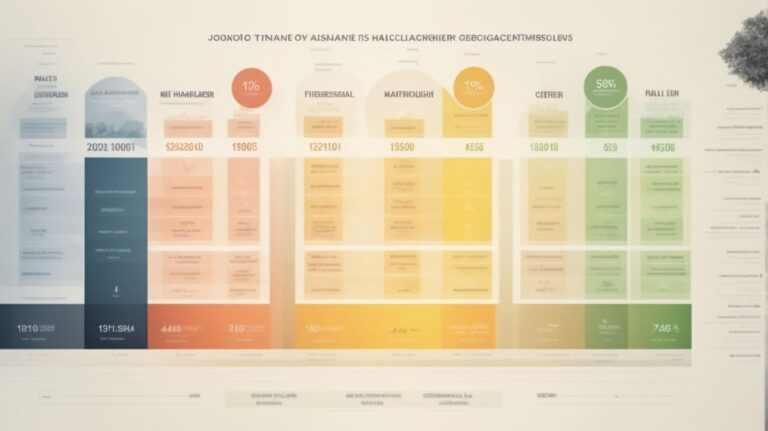Have you ever wondered how psychology is applied in the workplace? In this article, we will explore the fascinating world of Industrial-Organizational (IO) Psychology and its first major practical application.
From its history to its impact on the workplace, we will delve into the theories, concepts, and techniques used in this application. We will also provide real-life examples of how it has been implemented in various industries and discuss its future evolution. Join us as we uncover the exciting world of IO Psychology and its practical application in the workplace.
Contents
- 1 Key Takeaways:
- 2 What is IO Psychology?
- 3 What is the First Major Practical Application of IO Psychology?
- 4 What is the Impact of the First Major Practical Application of IO Psychology?
- 5 How Does the First Major Practical Application of IO Psychology Work?
- 6 What are Some Examples of the First Major Practical Application of IO Psychology in Action?
- 7 What is the Future of the First Major Practical Application of IO Psychology?
- 8 Frequently Asked Questions
- 8.1 What is the first major practical application of IO psychology?
- 8.2 How did the first major practical application of IO psychology come about?
- 8.3 What are some specific areas where IO psychology has been applied in the workplace?
- 8.4 How has the first major practical application of IO psychology evolved over time?
- 8.5 What are some challenges associated with implementing IO psychology in the workplace?
- 8.6 What is the importance of the first major practical application of IO psychology in modern organizations?
Key Takeaways:
What is IO Psychology?
Industrial-organizational (I/O) psychology is a branch of psychology that focuses on the scientific study of human behavior in the workplace and the application of psychological theories and principles to organizations and employees.
Industrial and organizational (I/O) psychology covers a wide range of topics, including employee selection, training and development, performance appraisal, work motivation, leadership, and organizational culture. The main objective of this field is to improve the well-being and performance of individuals and the organizations they work for. Through studying factors that influence behavior, communication, and decision-making in the workplace, I/O psychologists help develop more effective strategies for managing human resources and optimizing organizational processes.
As workplaces continue to evolve, I/O psychology has become increasingly relevant in addressing contemporary challenges such as diversity and inclusion, work-life balance, and technological advancements. By staying current and adapting to changing needs, I/O psychologists play a crucial role in creating a healthier and more productive work environment for all.
What is the First Major Practical Application of IO Psychology?
The first major practical application of industrial-organizational (I/O) psychology can be traced back to its significant role during World War I and World War II, particularly in the areas of job selection, productivity enhancement, and motivation management within military organizations.
During World War I and World War II, the need for efficient and effective utilization of human resources in military settings became a critical priority. Industrial-organizational psychologists played a pivotal role in developing methods for selecting and assessing personnel for various roles within the armed forces.
They focused on improving productivity and motivation among soldiers, addressing crucial challenges faced during wartime. Their contributions not only impacted military operations but also laid the foundation for the subsequent application of I/O psychology in civilian workplaces, influencing modern organizational psychology and human resource management practices.
What is the History of the First Major Practical Application of IO Psychology?
The history of the first major practical application of industrial-organizational (I/O) psychology is deeply intertwined with the evolving needs of organizations and military forces during World War I and World War II, marking a pivotal era in the scientific study and application of psychological principles to enhance industrial and organizational operations.
During World War I, I/O psychology emerged as a response to the pressing demand for efficient selection and placement of military personnel, as well as the need to improve productivity and morale within wartime industries.
Psychologists such as Robert Yerkes and Walter Dill Scott played integral roles in shaping the discipline, applying psychological testing and assessment methods to aid in military recruitment and training.
As the war efforts escalated, the significance of I/O psychology extended beyond the military domain and permeated into industrial settings, with a focus on optimizing worker performance, leadership, and organizational dynamics. This pivotal shift laid the foundation for the field’s expansion into a wide range of organizational contexts, influencing human resource management, employee training, and work motivation strategies.
The impact of I/O psychology during World War II further solidified its importance, as psychologists were actively involved in refining personnel selection processes, designing training programs, and addressing issues of morale and stress among soldiers.
The collaborative efforts between psychologists and industry leaders during this period not only improved the effectiveness of wartime strategies but also contributed to the development of modern personnel and organizational practices.
What is the Impact of the First Major Practical Application of IO Psychology?
The first major practical application of industrial-organizational (I/O) psychology has had a profound impact on the workplace, influencing areas such as employee satisfaction, technological advancements, automation, diversity, equity, inclusion, and organizational dynamics, with implications that continue to resonate in contemporary organizational settings.
One of the significant effects of this pioneering application of I/O psychology has been evident in employee satisfaction. By understanding human behavior and motivation, organizations have been able to create conducive work environments, leading to higher job satisfaction and enhanced productivity.
The emphasis on technological advancements stemming from I/O psychology has redefined how work is conducted. The utilization of data analytics, AI, and machine learning has revolutionized organizational processes, improving efficiency and decision-making.
The integration of diversity, equity, and inclusion principles has been another profound outcome. I/O psychology has played a pivotal role in promoting diverse and inclusive workplaces, boosting cooperative efforts and innovation in organizations.
How Has it Changed the Workplace?
The first major practical application of industrial-organizational (I/O) psychology has fundamentally transformed the workplace, reshaping employee satisfaction, technological integration, automation processes, and fostering environments of diversity, equity, and inclusion.
The adoption of I/O psychology principles has enhanced employee satisfaction by focusing on job design, motivation, and work-life balance, resulting in higher engagement and reduced turnover rates.
Its impact on technological integration has streamlined processes, optimized workflows, and facilitated the seamless implementation of digital tools, thereby increasing productivity and organizational efficiency.
Through the application of I/O psychology, automation processes have been refined to complement human capabilities, ensuring a harmonious interaction between technology and human workforce, leading to improved job quality and resource allocation.
In terms of diversity and inclusion, I/O psychology has played a pivotal role in developing inclusive leadership models, implementing unbiased hiring practices, and promoting a culture of respect and understanding, thus cultivating a more inclusive and equitable work environment.
What are the Benefits of this Application?
The first major practical application of industrial-organizational (I/O) psychology has yielded numerous benefits for organizations and employees, including enhanced productivity, motivation, and employee satisfaction, leading to more efficient and fulfilling workplace environments.
Through the implementation of I/O psychology principles, organizations have witnessed a substantial increase in productivity as employees are give the power toed with the tools and knowledge to effectively manage their tasks and time.
The application of motivational strategies derived from I/O psychology has resulted in heightened employee engagement and enthusiasm, consequently fostering a more positive work environment. The emphasis on employee satisfaction has led to reduced turnover rates and a greater sense of loyalty, ultimately contributing to the longevity and success of the organization.
In essence, the integration of I/O psychology principles has undeniably reshaped the landscape of workplace dynamics, nurturing a culture of productivity, motivation, and fulfillment.
How Does the First Major Practical Application of IO Psychology Work?
The first major practical application of industrial-organizational (I/O) psychology operates through the utilization of various theories, concepts, techniques, and tools, aimed at addressing organizational challenges and optimizing human behavior within workplace settings.
Industrial and organizational psychology, also known as I/O psychology, applies psychological principles and techniques to organizational settings to enhance workplace productivity, efficiency, and employee well-being.
It encompasses a range of areas, including personnel selection, training and development, performance appraisal, leadership, and organizational culture. One of the key theoretical underpinnings of I/O psychology is the understanding of human behavior in work environments and the impact of organizational structures and processes.
The application of psychometric tools and assessment techniques plays a crucial role in evaluating individual and group behavior, abilities, and personality traits within the workplace.
What Theories and Concepts Does it Utilize?
The first major practical application of industrial-organizational (I/O) psychology draws upon a myriad of theories and concepts, informed by the expertise and research of I/O psychologists, to address the complexities of the organizational field and enhance workplace dynamics.
These theories and concepts encompass various psychological principles such as motivation, leadership, work attitudes, and organizational behavior, which serve as the foundation for understanding human behavior in the workplace.
I/O psychologists strive to apply evidence-based practices that reflect the latest scientific research to optimize employee performance, job satisfaction, and overall organizational effectiveness. The role of I/O psychologists extends beyond individual psychology to the broader context of organizational systems and structures.
By utilizing their expertise in data analysis, assessment methods, and organizational assessment, I/O psychologists can offer valuable insights into developing strategies for talent management, training programs, and workplace diversity initiatives.
What Techniques and Tools are Used?
The first major practical application of industrial-organizational (I/O) psychology employs a diverse array of techniques and tools, ranging from workforce analyses and productivity breakdowns to retention strategies and effectiveness assessments, tailored to the needs of both for-profit and not-for-profit organizations.
Workforce analyses in I/O psychology involve examining the composition and dynamics of an organization’s workforce. This includes demographics, skills, and roles.
Productivity breakdowns delve into the various factors influencing employees’ productivity levels. These factors may include workload, task complexity, and environmental conditions.
Retention strategies aim to identify and address factors contributing to employee turnover. This involves employing interventions to enhance job satisfaction and engagement.
Effectiveness assessments gauge the impact of HR programs and practices on organizational goals. This is done by utilizing performance metrics and feedback mechanisms to refine strategies.
These techniques, underpinned by I/O psychology principles, play a pivotal role in optimizing organizational performance. They also help foster a conducive work environment for employees.
What are Some Examples of the First Major Practical Application of IO Psychology in Action?
The first major practical application of industrial-organizational (I/O) psychology has been implemented across diverse industries, showcasing tangible results in areas such as employee productivity, workforce diversity, and inclusive organizational practices.
In the technology sector, I/O psychology has played an integral role in optimizing team dynamics and increasing productivity. This is achieved through various interventions such as job redesign and training programs.
In the healthcare industry, the application of I/O psychology has led to the development of inclusive hiring practices. This has resulted in a more diverse workforce that better reflects the patient population.
In the finance sector, I/O psychology has been instrumental in implementing fair compensation practices and fostering an inclusive organizational culture. This has led to improved employee retention and overall performance.
How Has it Been Implemented in Different Industries?
The first major practical application of industrial-organizational (I/O) psychology has been effectively implemented in diverse industries, guided by the learning objectives of professional associations and tailored to address the unique tasks and challenges identified by the U.S. Department of Labor, resulting in notable improvements in employee productivity, retention, and organizational effectiveness.
For example, within the healthcare sector, I/O psychology principles have been harnessed to enhance team dynamics and leadership development, aligning with the objectives of professional healthcare associations to foster a supportive and efficient work environment.
In the manufacturing industry, I/O psychology has contributed to restructuring workflows and optimizing job designs to mitigate workplace stress, aligning with the U.S. Department of Labor’s focus on ensuring occupational safety and health.
This practical application has also led to the implementation of targeted training programs that address the specific needs of different industries, thereby fulfilling the learning objectives outlined by professional associations and the U.S. Department of Labor.
Through these tailored interventions, businesses have witnessed a positive impact on employee satisfaction, motivation, and overall performance.
What Results Have Been Seen?
The application of the first major practical application of industrial-organizational (I/O) psychology has yielded notable results across various industries, manifesting in improved employee productivity, enhanced diversity and inclusion in the workplace, and novel approaches to organizational dynamics.
Organizations implementing I/O psychology have reported a significant rise in employee satisfaction and performance. This has been attributed to the integration of motivational strategies tailored to individual preferences, resulting in a more engaged workforce.
In addition, the emphasis on diversity and inclusion, as supported by I/O psychology principles, has led to the development of more comprehensive training and development programs, fostering an environment of respect and equality.
The application of I/O psychology has sparked the adoption of innovative approaches to organizational dynamics, including flexible work structures, collaborative spaces, and agile decision-making processes, thereby enhancing adaptability and responsiveness to change in the current business landscape.
What is the Future of the First Major Practical Application of IO Psychology?
The future of the first major practical application of I/O psychology holds promise for further evolution and expanded applications, driven by the changing demands of the workforce, the refinement of job analysis methodologies, and the advancements in personnel recruitment and selection processes.
As technology continues to reshape the workplace, I/O psychologists are adapting their practices to accommodate remote work, virtual teams, and the increasing significance of digital skills.
In response to the changing nature of work, job analysis has evolved beyond traditional tasks to encompass competencies, emotional intelligence, and adaptability, creating a more holistic understanding of job requirements.
The innovations in personnel recruitment and selection have integrated data-driven approaches, gamification, and AI-powered tools to enhance the identification of top talent and reduce biases.
How Will it Continue to Evolve?
The first major practical application of industrial-organizational (I/O) psychology is poised to continue evolving, offering significant career opportunities and contributing to the historical development of the field, particularly in response to the dynamics of the job market, the challenges of a polarized workforce, and the pursuit of the American Dream in the contemporary labor landscape.
As organizations seek to optimize productivity, bolster employee satisfaction, and navigate the intricacies of modern workplaces, I/O psychology remains pivotal. Its historical significance underpins current and future practices in understanding human behavior in organizational settings.
The shifting dynamics of the job market, including technological advancements, globalization, and remote work arrangements, highlight the need for I/O psychologists to address emerging challenges.
The complexities of a polarized workforce, encompassing diverse generational perspectives, cultural backgrounds, and work preferences, necessitate the application of I/O psychology to foster inclusivity, mitigate conflicts, and promote collaboration in the pursuit of common goals.
Within the context of the American Dream, I/O psychology contributes to creating equitable opportunities, addressing systemic barriers, and supporting individuals in realizing their potential. This aligns with the evolving aspirations of individuals in the workforce, emphasizing fulfillment, growth, and meaningful contributions to their organizations and society as a whole, thereby reinforcing the relevance and impact of I/O psychology in shaping the contemporary labor landscape.
What Other Applications May Stem from this First Major Application?
The first major practical application of industrial-organizational (I/O) psychology is likely to spawn other innovative applications, particularly in response to evolving job demands, the advancements in job analysis, personnel recruitment, selection technologies, and the increasing integration of automation and technology in organizational contexts.
The application of I/O psychology presents a paradigm shift in how organizations approach their workforce. With a focus on understanding human behavior in the workplace, this field is poised to revolutionize personnel management by leveraging insights from psychology to create more efficient and effective work environments.
As job roles continue to evolve, fueled by technological advancements and changing market dynamics, I/O psychology offers valuable tools for job analysis, aiding companies in defining and refining job requirements, competencies, and performance criteria.
In the realm of personnel recruitment and selection, I/O psychology can elevate the process by incorporating advanced assessment technologies, such as psychometric assessments and simulation exercises, to identify the most suitable candidates for diverse roles.
Frequently Asked Questions
What is the first major practical application of IO psychology?
The first major practical application of IO psychology is the use of psychological principles and research to improve workplace productivity and employee well-being.
How did the first major practical application of IO psychology come about?
The first major practical application of IO psychology emerged in the early 20th century, as researchers and practitioners began to apply psychological theories to the workplace.
What are some specific areas where IO psychology has been applied in the workplace?
Some specific areas where IO psychology has been applied include employee selection and assessment, training and development, performance management, and leadership development.
How has the first major practical application of IO psychology evolved over time?
The first major practical application of IO psychology has evolved significantly over time, with advancements in technology, globalization, and changing workplace dynamics influencing the field.
What are some challenges associated with implementing IO psychology in the workplace?
Challenges associated with implementing IO psychology in the workplace include resistance to change, lack of understanding or awareness of the field, and difficulty measuring the impact of interventions.
What is the importance of the first major practical application of IO psychology in modern organizations?
The first major practical application of IO psychology is crucial for promoting a healthy and productive work environment, improving employee satisfaction and retention, and ultimately contributing to the success of modern organizations.






